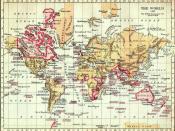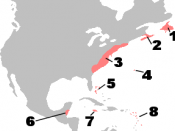The English colonies in the New World were not started for the purpose of being long-term settlements. In 1606, King James I of England granted the Virginia Company of London, a joint-stock company, a charter for settling in the area of present-day Virginia (The American Pageant, p. 28). The purpose was to gain a quick profit, but instead it hatched the beginning of a major colonization experiment. Beginning in Jamestown, colonization spread north up to present-day Maine, and south down to present-day Georgia. As the colonies developed, they were put into two categories; northern and southern. Topography, climate, and the various motivations for colonizing had a large influence on the economies of the two parts of English America. Although some may believe that agriculture was the economy of all of the English colonies, the effects of topography, climate, and motivations for colonization separated the economies of the northern and southern colonies.
Topography was the main influence on the economies of the northern and southern colonies. Comparing the two, the north, especially New England, had thin, rocky, soil, making farming difficult (An Outline of American History). As an exception, the "breadbasket colonies," which consisted of New York, New Jersey, and Pennsylvania, were able to harvest wheat. Because of New England's poor surface features, it became industrial. Cities like Boston and Philadelphia were used to collect the agricultural products, and export them (Kulikoff). The south, on the other hand, had extremely fertile soil, which is why they were very agricultural. The southern economy was called a plantation economy. Although they produced so many crops, they had few inland rivers in which they could use for exporting. That is why they shipped their crops north (Wood). Agricultural products, such as wheat, corn, tobacco, and rice, were in high demand in England and...


